
You can contribute to this web journal by sending your commentaries and reports to: info@nreportonline.com
BAYELSA AT 21: CONFRONTING THE CHALLENGE OF ADULTHOOD
Story and photos by Lindsay Barrett
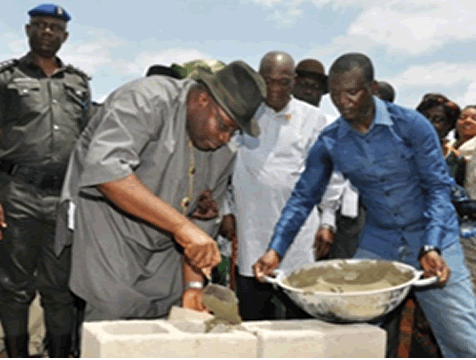
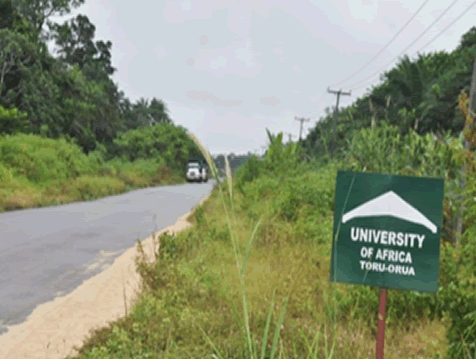
Gov. Dickson lays a foundation stone at the new Boro Town Kolokuma-OpokumaLGA(left). Part of the Western Senatorial District Highway leading to Ekeremor LGA one of the most remote areas of the Niger Delta (left).
Although Bayelsa State has just achieved its coming of age the saga of its existence over the last twenty-one years is replete with political echoes which suggest that the territory that it occupies has a level of importance in the national arena that belies its youth. Apart from the fact that the birthplace of Nigeria’s oil and gas industry is located there its emergence as the birthplace of the first person of Southern Minority origin to become President of the nation has thrown the young state even more prominently into the spotlight of public opinion. This is especially so because the governors who have held power in the statesince the advent of democratic rule in 1990, are individuals whose impact on the political scenehas been noticeably controversial.
The late D.S.P Alamieyeseigha, who designated himself the “Governor General of the Ijaw Nation” and openly espoused the cause of resource control as a central pillar of his policy thrust, set the tenor of representative governance of the state when he built the first major highway to traverse the core swamp terrain of the heartland of the Niger Delta leading to his hometown of Amassoma. Until then common wisdom expressed by most developers from other parts of Nigeria held that it would be too difficult and prohibitively expensive to access the riverine communities of the Niger Delta by road. In spite of this,foreign companies and the Federal Authorities have spent huge sums to access these areas in order to exploit the natural resources and earn humongous returns for the national coffers and a few privileged private individuals.
As a consequence although Bayelsa State occupies a territory that has contributed trillions of dollars for the national treasury since oil was discovered and first exported from the Öloibiri pioneer oil well in 1957, the impact on the welfare and development of the communities in the territory remained symptomatic of this neglect throughout the period from then until the state was created in 1996.
It is a fact for example that when the state was founded not a single community in the territory including the state capital of Yenagoa was on the national electricity grid. There were no major urban metropolises in the entire territory as most towns were home to shrinking populations of migratory youth and sedentary elderly people. Local employment was so scarce outside of the fields of subsistence farming and improvident public services that hardly anyone of working age and ability chose to stay at home. Not a single one of the four indigenous governors who have ruled Bayelsa can boast of coming from a town that was accessible by road when the state was founded. None of them had lived consistently in the territory for decades before the state was founded.
The entire Yenagoa LGA itself was a collection of villages with an overall population of less than fiftythousand people at the time, and it showed all the signs of developmental decline and decay, The area was redolent with the symptoms of decline characteristic of post-colonial neglect of a once vibrant but remote province, which had apparently lost political relevance with the departure of the colonial administrators.
This perception is particularly surprising especially because at the onset of colonial administration this was one of the territories where trade in agricultural produce such as palm oil and exotic spices had been developed by the Royal Niger Company into the basis for the eventual amalgamation of the entire country.
It is hard to explain therefore why when oil and gas became an even more substantial component in the economy of the independent nation the services and communal autonomy of the territory should decline to a state ofalmost hopeless debility. It is this dysfunctional reality that underlay agitations by the communities in the territory that eventually justified General Sani Abacha’s decision to create Bayelsa State.
In the period since the creation of the state its presence, and participation in national affairs as a component of the Federation, has been noticeably prominent. When D.S.P Alamieyeseigha took over as the first elected Governor of the state he quickly established infrastructural objectives that hadlong been neglected as priorities of his administration and this led him to confront the central government continually. As a result Bayelsa became characterised as something of a “prodigal” sibling of the older states and Alamieyeseigha himself was regarded as an advocate of radical restructuring of the relations between the centre and the regional authorities.
Unfortunately this viewpoint appeared to gain traction not as the basis for collaboration between the central authorities and the state government butrather as a motive for rivalry. Alamieyeseigha was eventually to fall victim to the consequences of this conflict as political rivalries emanating from the issues provoked by his attitude became central to the national discourse. It was this outcome that led to the ascendancy of Dr. Goodluck Jonathan and eventually to the first time that the Presidency of the nation was held by a member of a Southern minority ethnic group.
This was the major consequence of the emergence of Bayelsa State as a vital political component of the Federal state in the new era of representative governance for Nigeria. Goodluck Jonathan’s ascent to the Presidency ensured that his state of origin became the focus of attention of a wide cross section of analysts and observers and that the leadership of the state thus became the bellwether of leadership in the entire South-South geo-political zone in recent times.
As a consequence Bayelsa State occupies a role that is of paramount importance as a symbol of the building of the nation even while its own infrastructural and administrative development remains highly deficient in many respects.
Inthe annals of Nigerian politics this is of historic importance because at the same time that Bayelsa State is working towards the development of its local capacity in order to serve its long neglected communities it remains a key producer of revenue for the entire Federation. As it arrives at its twenty-first birthday the state must reflect both the initiatives of its leadership at home as well as its integration with the larger national entity. Without doubt the priorities that were identified by Chief Alamieyeseigha as being of integral value to the building of a credible unit of governance for the local communities remain imperative today.
However it is only in recent years that many of these priorities have been revived in the actual operations of the state government.During the period of the state’s intrusive cooperation with the Federal government when Goodluck Jonathan was President many local initiatives were ironically neglected.
The emergence of Seriake Dickson a local politician and lawyer as the PDP Governor in 2012 and once again in 2016 has brought the issue of communal empowerment as the core value of state’s creation to the fore. Dickson was regarded in the early days of his tenure as being a protégé of Dr. Jonathan. However he has shown himself to be a grassroots activist of his own persuasion as his tenure has extended and it is now obvious that he has revived and implemented several of the priorities that previous governors from Alamieyeseigha to Jonathan and Timipre Sylva had paid lip service to. It will be the first time that a governor of the state has completed the two full terms of his tenurewhen Dickson’s tenure ends in 2019. By that time Bayelsa will be approaching its twenty-third anniversary and the legacy of its entire existence as a mature state will be under scrutiny.
The burden of developing infrastructure in Bayelsa State has been aggravated during the last four or five years by a downturn in revenue accruing to the state from the Federation Account. In spite of this the Dickson administration has pursued a determined decision to create an irreversible legacy in terms of opening up the remote communities of the state by extending the road network exponentially.
It has completed several kilometres of primary roads over the initial stages of routes that Alamieyeseigha had proposed for three senatorial highways leading to communities in each Senatorial District.
The assistance that the state government gave to NDDC and Shell for the construction of a major road to Nembe has ensured that a part of the Eastern Senatorial Highway, the most far-reaching symbol of communal accessibility in the state since Alamieyeseigha’s Amassoma road project, has now been completed.
As a consequence of this development the establishment of a modern state-of-the-art sports stadium under the supervision of the Deputy Governor of the State retired Rear Admiral Gboribiogha John Jonah in Nembe has placed the town firmly on the map of communities that can host major sports events in the South-South geopolitical zone.So far the Western Senatorial highway has just passed the Governor’s own hometown of Toru Orrua in Sagbama LGA and sand-filling in readiness for further construction to the distant communities of Ekeremor LGA has opened up the route. The Central Senatorial Highway has also been commenced with a superbly constructed, though relatively short,Chinese built first phase from Yenagoa to Ayama in Southern Ijaw LGA.
The fact that these roads are now an integral part of the state’s autonomous transportation system enhances internal movement and connectivity between communities within the state to an unprecedented extent. Bayelsans can now contemplate travelling from their capital to some remote communities without traversing neighbouring states in the near future. This will enhance the sense of communal connectivity that any mature and potentially viable state needs in order to progress.
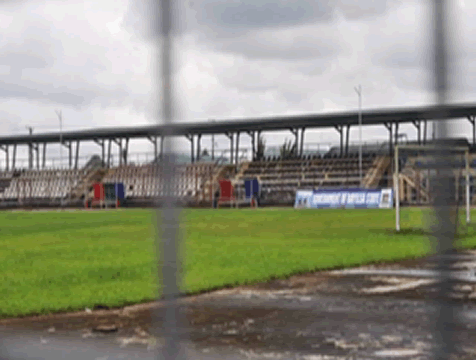
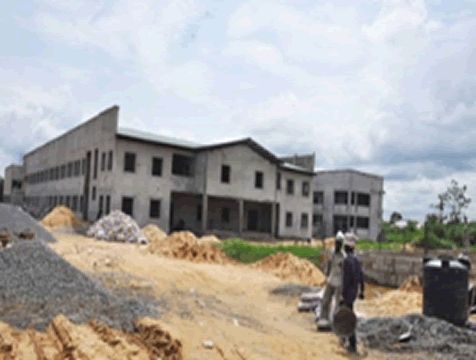
Left) The Nembe Sports stadium. (Right) The University of Africa Administrative block under construction in Toru Orrua.
In recent months the incumbent Administration has also turned its attention to enhanced expansion of services in two other major sectors of endeavour; those of education, and health. The Governor has been outspoken over his intention to raise the standard of delivery of education throughout the state and has initiated a number of projects and policies that have generated much discussion among leading stakeholders.
In planning to change the profile of educational service delivery Governor Dickson has instituted a series of new projects that have become hallmarks of his desire to, as he told this writer, “leave Bayelsa as number one in educational services when I leave office”.
In keeping with this intention he has established a major secondary institution known as the Ijaw National Academy in Kaiama and is building a university known as the University of Africa in his hometown of Toru Orrua. In addition to these he has also initiated a sports academy at Asuama near to Yenagoa and has given notable assistance to existing institutions such as the School of Health at Ogbiaand the School of Nursing at Tombia. However some of these initiatives must be considered in the context of earlier endeavours in the sector taken by some of the incumbent’s predecessors.
Chief Alamieyeseigha founded the Niger Delta University which is sited in his hometown of Amassoma in Southern Ijaw LGA while President Jonathan sited the Federal University of Otuoke in his home town of Otuoke in the Ogbia LGA. Some critics of Governor Dickson’s actions have suggested that he has started new projects while neglecting support for the older ones.
However he has replied these critics by asserting that he has not reduced the level of the state’s contributions to any of the institutions that he found working.
He insists that he has only created institutions whose relevance and viability will match the growth of the state’s viability as infrastructural expansion continues apace.
The external perception of Bayelsa State’s image over the years has been bedeviled by the internal rivalries of communities as well as of individual political participants.
In spite of this the state is one unit of the Federation that should be regarded as being potentially aneffective tourist destination. Insecurity in the beautiful creeks has remained a major obstacle to one aspect of the hospitality industry but Yenagoa, which is now a growing metropolis of well over a quarter of a million people from all over Nigeria has gradually developed a good list of two and three star hotels.Bayelsa State’s historic and cultural richness is legendary and in the future it is to be hoped that the state government will take advantage of these attributes to develop marine festivals that will display the unique traditions of the people such as war canoe regattas, fishing and swimming festivals and historic sightseeing tours.
The development of a new town near to Kaiama, which is to be known as Boro Town in honour of Isaac Adaka Borothe late martyr to the cause of Ijaw liberation is one of the most symbolic and ambitious initiatives that the state government has embarked upon. If this venture is successfully established as a new urban entity it will also serve as the focal point for the state’s justification for its creation, as those who protested the marginalisation of the Ijaws were also the ones who inspired the demand for a state of their own.
While Governor Dickson has been highly vocal in his support for, and advocacy of, the principles to which the radical protesters adhered, he has been an equally vocal promoter of nationalistic Nigerian objectives. He often insists that Bayelsa State will only be a strong and viable unit within the context of a united Nigeria, and has asserted in various forums that he believes that the state’s future is intricately joined to the future of the entire nation.
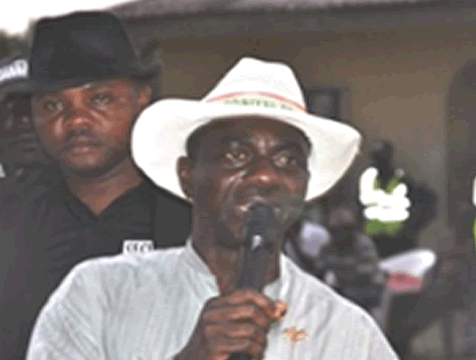

Political leaders in Bayelsa must keep in touch with their grassroots communities: (left) Hon. Fred Agbedi campaigns in his hometown of Agoro. (Right) Hon. Douye Diri (third from right in rear row) joins the elders and community activists in ameeting in his village of Sampou, in KOLGA
The twenty-first birthday of Bayelsa State was commemorated on the same day that Nigeria marked its fifty-seventh anniversary. What this congruence of the celebratory date should bring to mind is the importance that all leaders of the state’s affairs should place on the preservation of communal service. Over the last two decades many Bayelsans, especially members of the political class, have attained national reputations. The Governors themselves have always assumed national duties as symbolised by the emergence of Goodluck Jonathan as President. In recent months Seriake Dickson has played a vital role in attempts to restore the credibility of the Peoples Democratic Party, while Senator Heineken Lokpobiri, pioneer Speaker of the Bayelsa State House of Assembly and formerly regarded as one of the state’s young PDP lions, has become Minister of State for Agriculture and Rural Development in the APC cabinet. Hon. Fred Agbedi who is now occupying the House of Representatives seat that wasvacated by Governor Dickson is Chairman of the important House Committee on the Gas Industry. He is recognised as one of Nigeria’s most experienced legislators because he had served in the House of Representatives in theparliament of the aborted ThirdRepublic and is one of only three legislators from that period who are serving in the contemporary House.Previously unknown political actors have also been thrust into prominence by their advocacy on behalf of the state and the region.The names of Representative Douye Diri, or Senator Emmanuel Paulker, and the former NDDC Chief Executive Timi Alaibe,have become widely known in the annals of Nigerian contemporary political discourse as a consequence of their outspokenness in defending the interests of Bayelsa State, andas the state confronts its adulthood the spirit of its youthful advocacy of protection and preservation of the rights of the marginalised must be retainedas the keynote concern of its leadership as well as of its people.
First published in The Vanguard, Sunday 29th October 2017with Headline: BAYELS AND OIL: At Last Something to Show After Contributing Trillions To National Coffers
Contact us: info@nreportonline.com © Copyright 2016 NREPORT All Rights Reserved